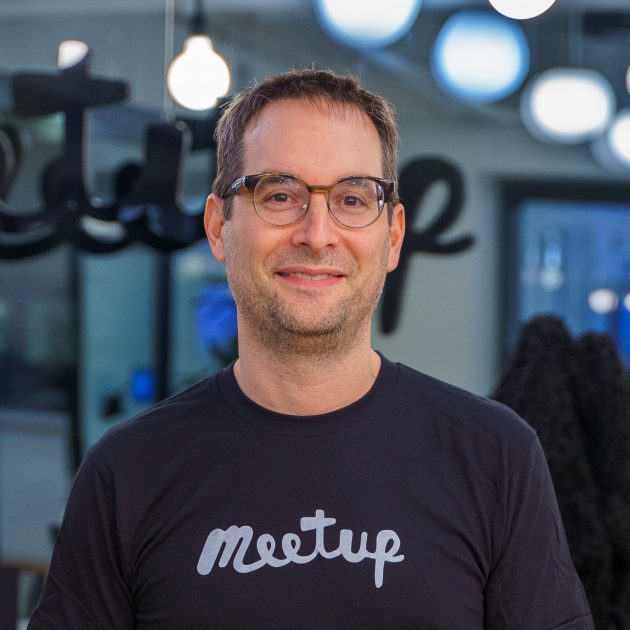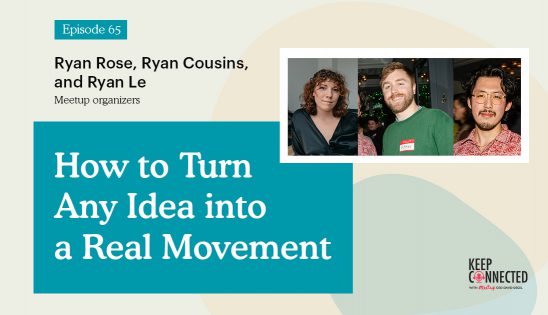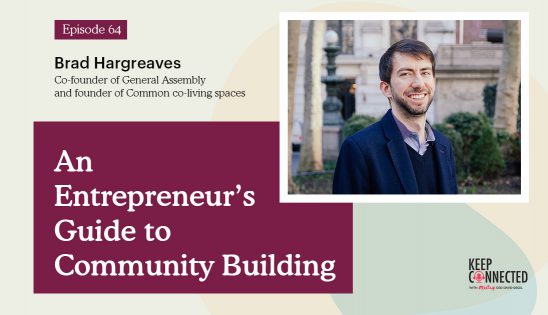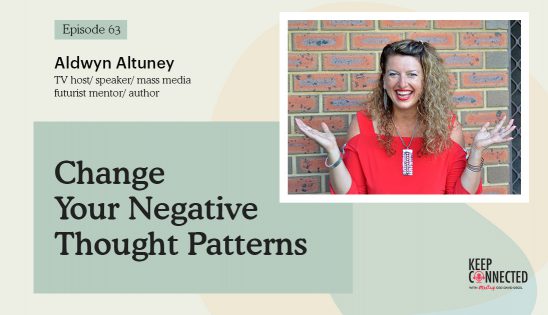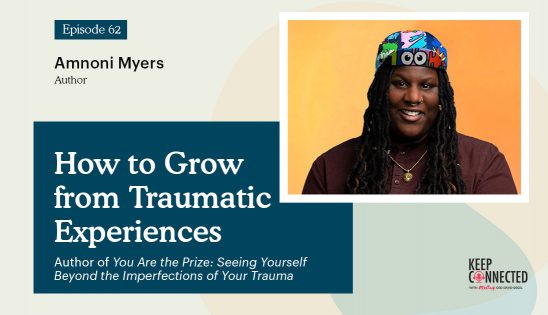Christina Howell knows the power of the written word. Her writing Meetup groups, Happy Writing: Munich and Shut up & Write!, have helped thousands of writers make time to put pen to paper. In this episode, you’ll hear how Christina quit her job as a project manager to become a memoirist living in her dream city, all while running a thriving global writing community. Tune in for practical advice on overcoming imposter syndrome, checking items off your bucket list, and making time for creative passion projects.
Ranked as one of the top 25 CEO podcasts on Feedspot, Keep Connected with Meetup CEO David Siegel is a podcast about the power of community. For more details on other episodes, visit Keep Connected on the Meetup Community Matters blog.
We hope you’ll keep connected with us. Drop us a line at podcast@meetup.com. If you like the podcast, be sure to subscribe and leave us a rating on Apple Podcasts!
Learn more about Keep Connected host David Siegel’s experience as a leader and decision maker in his book, Decide & Conquer. Pre-order your copy today!
Episode 20: Write Your Own Future
We have Christina Howell with us. She is the organizer of Memoir Mentors Munich and has helped hundreds of writers to realize their dream. If you want to hear about how a community can change lives, then you’ll enjoy this episode. Let’s go.
—
Christina Howell, what an introduction. You live the life. You’re traveling around the world and have insane experiences, which I can’t wait for you to share some of. You’re the leader of two big Meetup groups, Memoir Mentors and Shut Up & Write!. Welcome to the show. I’m so glad you’re here.
Thank you.
There’s so much that I want to discuss with you about your perspective on community and the impact that community could have on writing and editing but I got to start with this. The title of your memoir is Magicians, Crossdressers, and My Uterus. That is a title that someone’s going to take off the bookshelf and want to buy immediately. Could you elaborate a little bit? It doesn’t have to be all three but at least 2 of the 3.
Why don’t we start with cross-dressers? I had been single for a while and I kept going on these crazy dates, not intentionally. I kept having these stories. My friends and family would say, “Christina, you need to write a book.” I would laugh. I was a project manager. I wasn’t a writer. Why would I write a book? I went on two dates in two weeks with two different men who both were named Kevin, incidentally, who both told me that they looked good in a dress. I was like, “That’s interesting.”
That’s not on your match profile or something that you like Kevins with dresses?
I checked. I couldn’t see anything there that would lead cross-dressers to my profile. Maybe there’s something about it that the universe is telling me I need to be with a cross-dresser. I don’t know but I knew at that moment that was my sign. I needed to write a book because I could not make this crap up. That’s the cross-dresser part. The uterus part is I’ve had multiple people asked me if my uterus is okay because I was married for nine years and never had children.
That’s a first date question?
Yes, first and only date question. I wrote an essay about this called My Uterus is Fine. Thanks for Asking. That was my first published piece.
Did that do well?
Yes. I got a lot of attention on it. You’re going to have to read the book.
Intrigue is killing me. I like it. You have me wanting for more. This is great. The book is largely about your experience dating.
Dating experiences and then what happened in my life prior to dating to set me up for these crazy experiences.
Workshops and panel discussions can contribute to happy writing.
Before we go back to you, which I do because you’re so interesting, let’s talk a little bit about the two Meetup groups that you lead and there’s another Meetup group that you also co-lead of. Shut Up & Write! First, it’s a pro Meetup group in 51 different countries with 335 groups and 80,000 members You’re on the Munich group. Can you tell us a little bit more about what that group does, who it attracts, how it helps, how it’s evolved, all that good stuff?
I co-lead Shut Up & Write! Munich and the Happy Writing Munich group. For both of them, the primary mission is to provide this safe, welcoming space for writers of all genres and all skill levels. It’s a place for people to come and get things done together. The way that it works is we’ll meet twice a week with Shut Up & Write! and four times a week with Happy Writing. We have productivity sessions where we’ll come together, introduce ourselves, say what we’re writing and what our intentions are for that session. If we have any challenges or successes we want to share, we’ll share them during that time.
We say, “Shut up and write or happy writing.” We’ll turn off our cameras or put our heads down and start getting work done. Write whatever it is that we are working on that day. We write for an hour, come back after that hour and report back how it went for us. It’s this incredible atmosphere that allows people to be a lot more productive when you’ve got that little layer of accountability and this energy in the room of a bunch of other people writing there with you.
What happens when people talk during Shut Up & Write? Is it a library where they’re shushed and asked not to return? Do they have to shut up and write?
There are some dirty looks. Some people don’t see the dirty looks but mostly people respect it and are happy to have this space. Happy Writing also does the same format but has an addition to this. It also has workshops and panel discussions. We did our first writer retreat in Austria. It was a blast.
Is the belief there that accountability is so important that some people need that? I have three kids and one of my kids has trouble studying by themselves. They need to be with other people when they’re studying. They have their video on while someone else is studying. They’re shutting up and working at the same time. Sometimes people need to be around other people. Is that why it’s that level of frequency?
Yes. We have people all around the world that join us and so we have it at different times of the day. We have people in Europe, Philippines, Australia that comes sometimes and United States. We want to have times that are available for everyone. Maybe I’m like your son. If I’m left to my own devices, I can find lots of excuses not to write. Sometimes I revert to doing my taxes instead of writing.
There are two things that people hate the most and tax is one of them. That tells you how difficult it could sometimes be to write a solitary activity. Before I took on the job as CEO of Meetup and I don’t know if I’ve ever shared this story, this is very exciting for me and for all of our readers, Scott Heiferman is the Founder and CEO of Meetup for sixteen years prior to me joining. I spent a day going into a whole bunch of Meetup groups.

My favorite group was a group that met 3 or 4 times a week. It was a group of PhD students who were all working on their dissertation. Some dissertations were about chemistry and some were about history. They had nothing to do with each other. They held each other accountable by meeting nearly every day. Similar to you, probably every other day. They ended up attributing the fact that they made significant progress in their PhDs. They probably would not have gotten their PhDs and dissertations done if not for that group. It was powerful for me to speak to these individuals. How many books do you think have come out and the groups that you run play a part in some of those books? What would you guess?
I know that in 2020, at least ten people have finished their first drafts or published.
Let’s talk a little bit about what other attributes in your mind are facilitated by attending. Accountability is certainly one of them. Is there anything around confidence or the relationships that are built that also comes out of these groups?
With my first Shut Up & Write! meeting, I was terrified to go in. I don’t know why I was so terrified exactly. I was sure that everyone was going to laugh at me and know that I was the impostor that I felt like I was but no one did. Instead, they were welcoming. Many people will come in and you’ll ask what they’re working on. They’ll say, “I’m working on this thing but I’m not a real writer.” Many people say “I’m not a real writer.”
If you’ve committed yourself to the fact that you were going to come to a Meetup event about writing, chances are you’re a writer. It doesn’t have to be the next great American novel. There are so many different people that are working on different things. It is helpful to see that other people have gone through the same things and have the same struggles. It’s incredible to think how much I have changed in the past years since I joined. I love seeing other people do this too. It helps boost your confidence when you know other people have been in your shoes.
It’s any kind of struggle you’re having, whether it’d be with writer’s block or trying to figure out if you need an agent. There are a million different things that you face as a writer that chances are someone else in the group has also at some point in their career experienced that hopefully overcome it and can share what helped them or at least offer condolences, support and let you know that you’re not alone.
Among your cohort, how common is imposter syndrome in the way that you described it? Is it omnipresent?
There’s one woman in my group that has published twenty something novels. She is a big deal. I heard her say, “I’m not a real writer.” I was like, “What do you mean you’re not a real writer?” I call crap.
Does she believe you afterwards? Do you talk to her? Will she still say, “I’m not a real writer?” When is your recovery over on that 28th novel or something?
I don’t know. It’s something in the personality of a writer maybe but probably a big part of it is as artists, so much of our identity is wrapped up in money. If you want to make a lot of money, being an artist probably isn’t where you’d think to turn first. It’s difficult for people to feel like this is a real job or that they’re worthy. It takes a lot of courage to do this. There’s shame in admitting that you’re in the arts for some reason. People who don’t work in the arts don’t have any idea what it takes.
It’s about external validation oftentimes versus finding internal validation for things. The more that people overweight external validation, which is the case for probably 90% of people, oftentimes, the unhappier people ultimately end up are because then they can’t do those things that is where their passions are, which could be the arts or business. It could be anything but people should pursue those passions.
What do you do to make sure that you are sharing your story? Not your crazy story about leaving and becoming a project manager in Kansas City but your story and journey around building self-esteem, confidence and overcoming. No one ever overcomes it but you have improved upon it from an impostor syndrome standpoint. Are you so aware that you make an effort to try to talk about it as often as you can? Talk about that a little.
I try to hit it right at the beginning when people start talking about what their project is. As soon as I hear somebody say, “I’m kind of, sort of but I’m not really,” that’s the point where it’s so easy to come in and say, “You are here. You are a writer. You deserve to be here. All of us have gone through what you’re going through. By coming today, you’ve admitted that you are a writer. We welcome you.”
Let’s shift because I’ve got to hear about how you said, “F it all.” You’re in Kansas City. You’re a project manager. You decide to leave and bought a ticket to Scotland. I’m guessing you didn’t know exactly what to do next. Years later, you’re on this show with thousands of readers. You’ve done something right, clearly. What precipitated that experience if you’re open to sharing? Did you have any idea of what you were getting into? What were some learnings along the path?
I visited Munich for the first time in 2012 when I was working as a project manager. There was something about that time here in Munich, something about the city that spoke to me. I’d always loved to travel but being in Munich, something felt like home. There was some sense of belonging there. Instead of thinking, “I’d like to visit here again,” I thought, “I can see myself living here.” I had this idea formed.
For the next eight years, I was trying to figure out a way to get and live here. I tried to get transfers and look for jobs at the Munich office. I kept running into dead ends. I still was thinking about it but didn’t know how to do it. I hate to say luckily because I had a good friend who was going through a hard time in her life. She said, “If you want to do this, I’ll do it with you but I’m not going to say let’s move to Germany because I’ve never been there. Let’s travel for a year. What do you think?” I was like, “Are you serious?” She’s like, “I’m serious if you’re serious.”
It didn’t happen immediately. There’s a lot of souls searching that went into that decision but it ended to me selling my house, quitting my job and leaving for Scotland to start a trip that was supposed to be just one year of travel. It wasn’t an easy decision. I had a good job, a nice place to live, a lot of friends and my family there but what it came down to was regret. That was what finally did it for me.
You should do things today that when you look back, you know you did an awesome job.
The biggest motivator was the belief that you would look back and say, “Why didn’t I do this?” Almost a little bit of a FOMO, shall we say? FOMO could be an incredible motivator for people. What advice would you give to people who have those similar soulful yearning that your soul felt like it belongs in Munich? What advice would you give them, shut up and do it?
It’s not that easy. I’m not going to say just show up and do it. I’ve had that advice before and that’s not a helpful advice. You’ve got to think your way through it. At a certain point, you’ve got to throw logic out the window. Go with your soul and think, “If I’m 80, am I going to look back on this day and think, ‘What I did was cool,’ or am I going to look back and think, ‘That was my chance and I didn’t take it?’” I knew I would regret it the rest of my life if I didn’t take this chance. I would think, “What’s the worst thing that could happen?” It turns out that the worst thing that can happen usually isn’t that bad. The worst thing that could happen is, “I failed. It didn’t work out. I was scared, went home and got a job again.” So what? At least you know and tried it.
There are some decisions that are trapdoor decisions with very few meanings. You make a decision at the trapdoor and it’s hard to get back out of it. You decide to have a kid. You have a kid. It’s very hard to change that decision. Thank God and God willing that people do not try to change that. Almost 99.9% of most decisions are not trapdoor decisions and can be changed.
Quitting a job, selling a house, go into another country, all of those are not trapdoor decisions. You can go back and do any of those. Here’s a bit of a spoiler and this is a good time to mention this because you are an editor and a writer of a book. I have a book by HarperCollins called Decide and Conquer about decision-making. I could talk about my writing challenges as well during that time.
Congratulations.
Thank you. It’s a bit of journey, shall we say. For me, it was something that I had always wanted to do. It was a project during the pandemic where I said, “I have this opportunity during the pandemic. How do I turn this horrible tragedy into something that could be helpful for me and my goals?” I took this on. Enough about me though, let’s talk about you during the pandemic. You were in lockdown in England. My understanding is that you were a pretty frequent Meetup event attendee while you were there. Meetup and writing groups helped you in terms of finding a place. What happened there exactly? What was it like traveling during the pandemic and a lockdown?
It was pretty crazy. I had already decided that I was going to live in Munich but I was going to do one more trip. It was always one more trip. I started out in Italy, which was Italy 2019. That was pretty much the worst place I could have started. I ended up being cool because there was hardly anyone at the coliseum. It was a wonderful time to be there. We had a great time.

I went from there to do a house sit. Part of the way that I saved money while I was traveling was doing house sitting. I returned to a house that I’d done a number of times in Great Malvern, England, this little town in the Midlands. It was supposed to be a ten-day house sit. It turned into a 32-day house sit because the homeowner’s flights kept getting canceled again and again. By the time they got back, all the flights out were canceled. All the Airbnbs and hotels were closed. I was screwed.
You didn’t want to live with this couple?
I wouldn’t have mind it for a short-term. At first, that was the plan. We didn’t know how to navigate this. I have friends in England but not that close that they were willing to take me in. I was stressed out and worrying about where I was going to be staying. I went to my writing group, the Happy Writing group. I told them my dilemma. I said that all of the flights out of Birmingham have been canceled.
One of the ladies says, “Birmingham? I have a friend who has a home in Birmingham but she doesn’t live there right now. She’s stuck in Belgium. Do you want me to get in touch with her?” I was like, “Yes.” A Zoom call later, this stranger has invited me to let me stay at her home and use her car in exchange for paying for the utilities, which ended up being $9 a night. I ended up staying there for four months.
That’s better than a Rick Steves’ travel book. That came out of the Meetup group and reaching out to people, which speaks to the relationships that one develops and the optionality of those relationships where you don’t know what it can lead to. You don’t know if you could end up finding a publisher for your book because of that, an amazing person to interview, helpful research, marketing or who knows what. That’s an amazing story. Speaking of that, do you see that members tend to help each other on the relationship side as well? If so, specifically, what types of relationships tend to be the most helpful?
We have some wonderful people in this group. We’ve developed bonds with people. Some of them we’ve never met in person. At the Austria retreat, we had someone fly in from Greece who we’d been meeting with for years virtually. I felt like I knew her but I never met her in person. This has happened a number of times where we’ve developed these friendships beyond the writing aspect. There is something special about having this group of people who are doing the same thing and going through the same struggles that you are going through. We have that emotional connection that way and understanding of each other.
The in-person must have been powerful as I’m hearing you share about the relationships that you develop and the meaning of online. Tell us about the retreat when you did it in person in Austria or when you get back together in person. What happens when you’re in person that can’t be done online in your mind?
There are pluses and minuses to both. The in-person piece is you can make these one-on-one connections a lot easier and can catch up on the nitty-gritty of your novel or your life, whereas if you have the whole group on Zoom, you get to see little bits of everyone’s life but everyone gets to hear it so there are certain things you don’t want to share in the whole room. One person was showing us on her iPad some sketches she’d made of this world building that she was doing. That was cool to see that. Meanwhile, somebody else was in this other corner.
We did a lot of gaming as well. We played some card games and had a lot of fun with that. Then somebody else was like, “I’m going to take this opportunity to go for a mountain bike ride.” Then somebody else was like, “I’ll go with you.” I guess it was a hike. There’s an energy of being in person that you can’t get online. Having that group energy is pretty intense.
It’s okay to fail. It’s okay if things didn’t work out. What matters is you tried.
I love the word you used about the energy that surrounds someone that is hard to go through online. Although I feel the positive energy as we’re talking but I have a feeling that if we were in person, it’s the connection and energy that exists in it. I liked how you even added the group energy that exists. We have a segment of this show called rapid fire questions. I’m going to hit you with a couple of questions and see how it goes. Our audience will learn from it. First time you saw yourself as a leader, Christina?
It’s when I started the Memoir Mentors group.
What made you start that?
I was attending all of these groups online when COVID was coming on. As we were introducing ourselves, people kept talking about the memoirs they were writing. I noticed this embarrassment about admitting this because there’s something different about writing about your life than writing fiction. You’re writing about sometimes embarrassing topics. It’s a different kind of thing than fiction, poetry or anything. I thought, “Wouldn’t it be cool to have a space where we can all come together just memoirists and not have to worry about somebody judging us for our crazy stories about our crazy dates?”
I have to join your group. This part of my book is a memoir. I could use some camaraderie around it. You’ve been to a lot of places. Imagine if you could go to any place at any period of time, where would you go and when?
I would like to see a Queen concert somewhere.
Favorite Queen song?
Crazy Little Thing Called Love.
Do you have a favorite quote?
I do. Life is short. Live it now.
Name something on your bucket list. You’ve done a lot of things on your bucket list actually but there’s something big on your bucket list you haven’t done yet. If so, what?
I would love to go to Croatia and see these amazing waterfalls. It’s called Plitvice. Maybe go to some of the Game of Thrones locations while I’m there.
Here’s my last question. You’ve helped out so many people in writing and editing. You’re living your life to the fullest. You appreciate the fact that life is short. Live now. How do you want to be remembered?
I’d love it if people would remember what I’m doing. Take courage, inspiration and do it themselves.

I am confident that dozens, if not hundreds of people have probably already done that. The question is whether there’ll be hundreds, if not thousands of people in the future. It can and will be. That’s a beautiful thing to be remembered by. To be an inspiration to others, to live life the way that they believe they should be living their life. Not the way others believe that they should be living their life.
That can change the world.
Nothing left to say, except for that. Thank you so much, Christina.
Thanks so much, David. Good luck with your book.
Thank you.
—
Thanks for reading. What a special Meetup organizer. It makes you realize how oftentimes typical but also extraordinary, so many of our organizers are. This person knows how to live her life. Her message is anyone can be a writer. Even I can be. Anyone can be anything that they believe that they want to do and that’s a beautiful message. I’ll leave you with that. If you enjoy this episode, please subscribe. It’s not going to hurt. It’s a good thing to do. You never know when a great episode is going to come up that tickles your fantasy. Check out our past episodes and leave a review. We love your reviews. Let’s keep connected because life is better together.
Important Links:
- Memoir Mentors
- Shut Up & Write!
- Magicians, Crossdressers, and My Uterus
- My Uterus is Fine. Thanks for Asking
- Happy Writing
About Christina Howell
 In a former life, Christina Howell was a project manager for an international tech corporation in Kansas City, USA. She knew she loved to read, loved telling stories, and enjoyed writing her blog Go Find Glow but never thought about writing professionally until life kept handing her incredibly entertaining and unbelievable stories. She eventually acknowledged that her life was stranger than fiction and began work on her memoir, Magicians, Cross-dressers and My Uterus.
In a former life, Christina Howell was a project manager for an international tech corporation in Kansas City, USA. She knew she loved to read, loved telling stories, and enjoyed writing her blog Go Find Glow but never thought about writing professionally until life kept handing her incredibly entertaining and unbelievable stories. She eventually acknowledged that her life was stranger than fiction and began work on her memoir, Magicians, Cross-dressers and My Uterus.
Last modified on December 13, 2021


